At Indigo and Kulture, the African Diaspora, Reinterpreted
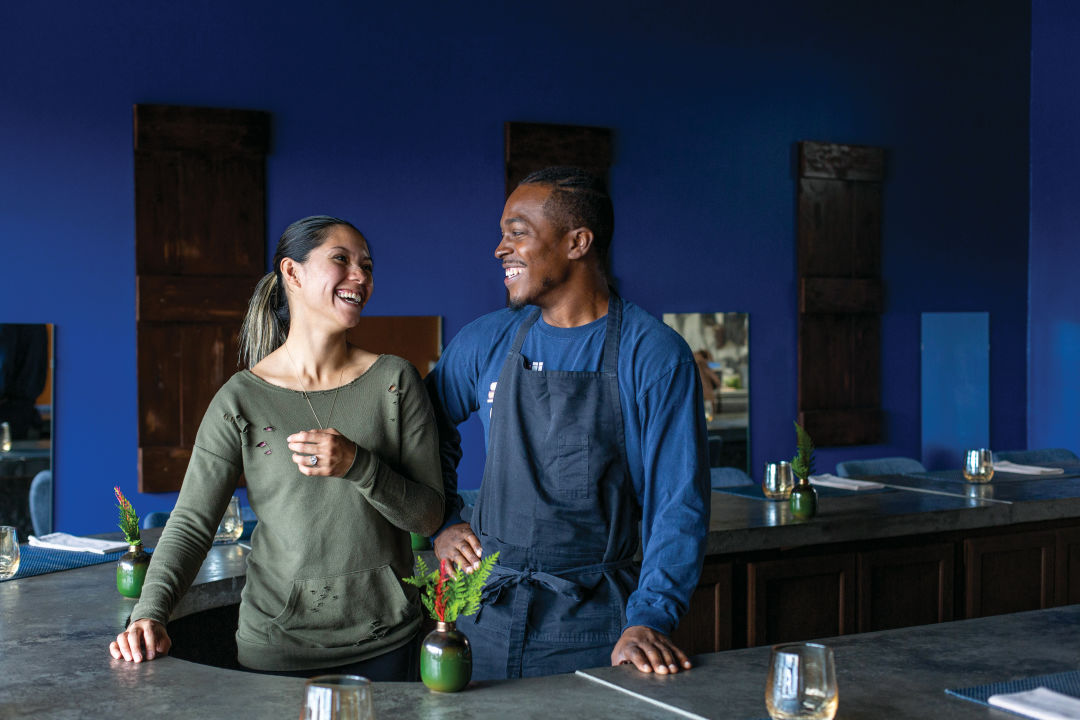
Chana and Jonny Rhodes at Indigo
Image: Jenn Duncan
Driving along Berry Road, I squinted to find Indigo, the restaurant that former Oxheart cook Jonny Rhodes opened in July with his wife, Chana, with the aim of sharing African American history through their menu. I nearly missed it, but there, next to the A&B Grocery, was this blue-and-copper shoebox. Diners from the early seating were chatting by the front door, lingering like an audience after a Broadway play.
The couple had originally planned to open a barbecue restaurant in the spot that is now home to Indigo, located south of Tidwell between I-45 and Hardy Toll Road, in an area not known for its fine dining. But they changed their minds, completing the build for their avant-garde neo-soul restaurant themselves over two years. For Rhodes, who grew up in the area, the restaurant represents a kind of homecoming.
The space is dominated by a large, horseshoe-shaped, stone bar with 13 seats—the max number of diners the place can accommodate at each seating, two of which take place every evening from Thursday through Sunday. Guests pay about $85 per person for one of three five-course tasting menus—herbivore, omnivore, and carnivore—featuring dishes with names like “Cornrows and Convictions” (autumn squash with benne seed sauce and gourd pickles) and “Eradication of Appropriation” (mollusk and wild boar andouille gumbo).
“It details the oppression of people with African ancestry and the indigenous Americans, and how their ingenuity through oppression gave us soul food,” Rhodes told me after my first visit.
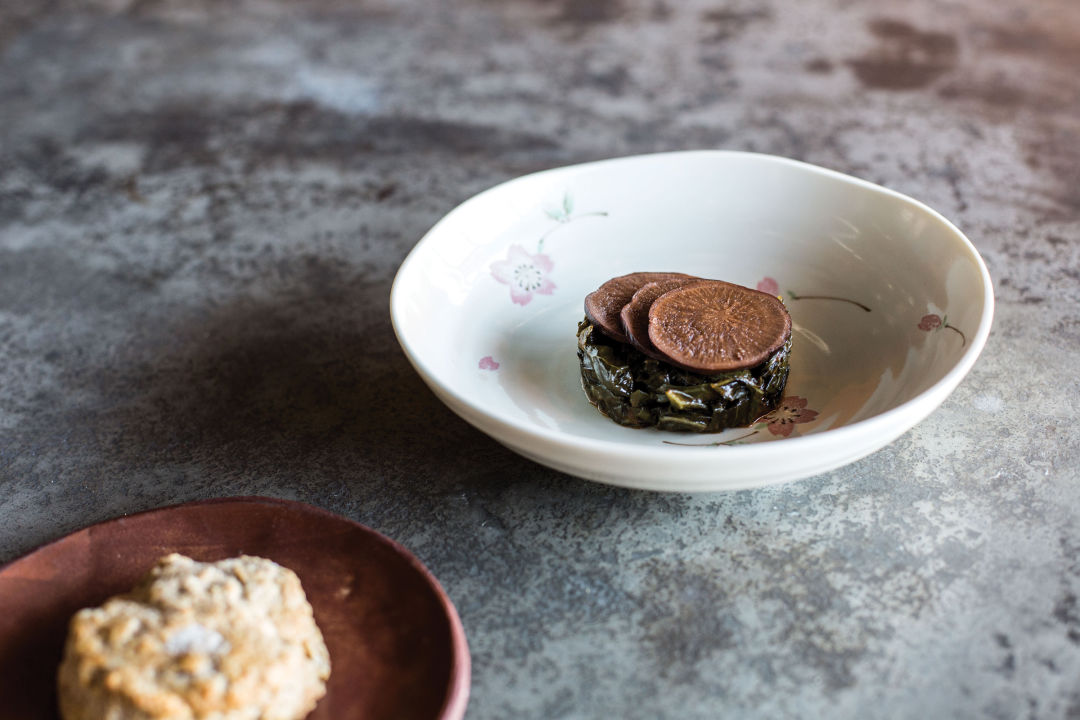
"Ten Toes Down," topped with preserved smoked turnip
Image: Jenn Duncan
As such, the cuisine is dominated by preparations African American communities through history used to survive—pickling, smoking, and canning among them. To cook his food, Rhodes primarily uses a miniature smoker and torch. Many of his vegetables are preserved for up to three years—the menu includes the date for each—using an exquisite technique that produces an outstanding range of flavors.
During each meal, the proprietors, a server, and a dishwasher work in plain sight of diners. As each dish arrives, Rhodes shares a story related to slavery, civil rights, or social justice. For example, when serving the smoked pastrami dish “Assimilation Is Not Freedom,” Rhodes reflected on the difference between the ways European immigrant communities and black populations have been treated in the U.S.
The seating arrangement encourages conversation. During one of my three visits, guests started chatting with each other, and by dessert, we found ourselves talking about the book The New Jim Crow by Michelle Alexander. Such exchanges are enriching, but it should be said that by itself, the food holds up marvelously.
The hearty “If Marcus Garvey…”—field peas, chopped carrots, and cauliflower pickled in 2017, served in a creamy curry—unites African, Caribbean, and indigenous American flavors for a crave-worthy result. The perfectly cooked, flaky cod dish known as “Domino!,” redolent of oak and served with ramp-ranch dressing and caramelized tomato, showcases Rhodes’s skill at the smoker. And the luscious “Descendants of Igbo”—named after the Nigerian ethnic group—features a smoked yam paired with crunchy oatmeal crumble and a fluffy, campfire-charred marshmallow, for a wonderful deconstructed version of familiar candied yams.
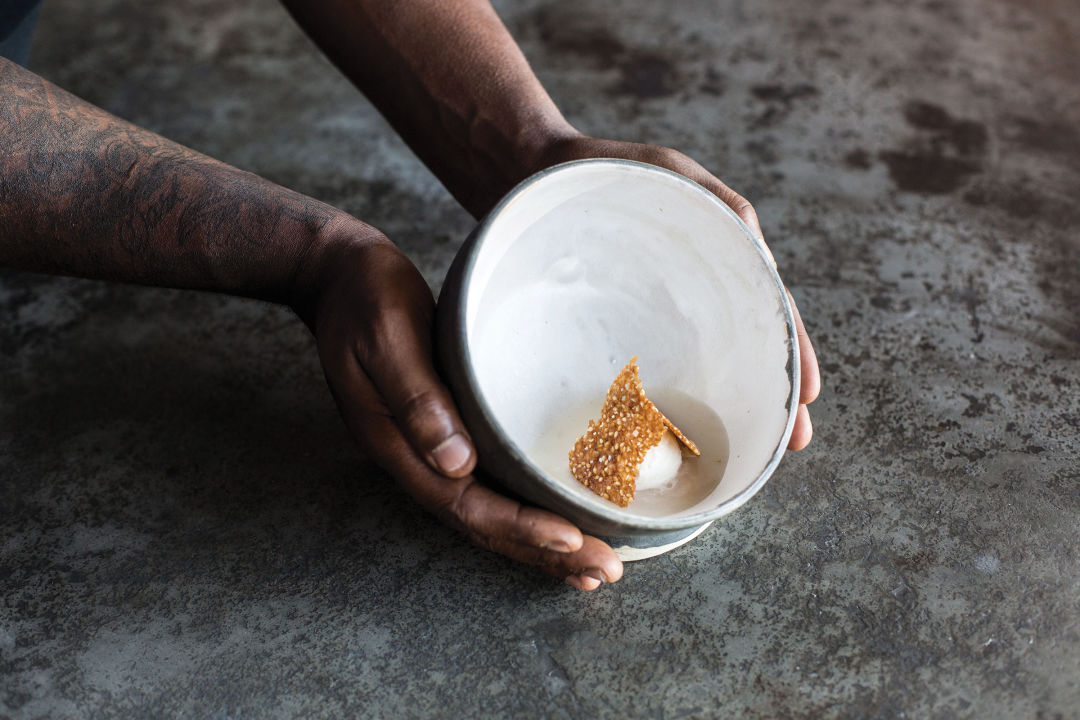
Soul-warming: "Jumpin' de Broom"
Image: Jenn Duncan
Perhaps no dish portrays Rhodes’s mission as lovingly and carefully as “Ten Toes Down,” an attempt to evoke the perseverance and ingenuity of slaves. Here, a smoked turnip, preserved in 2016, recalls a juicy winter ham (the menu refers to it as a “vegetable ham”), while collard greens in slabber sauce—a thick, peppery, stock that slaves used to cover the taste of subpar meat—features a bright pop of brininess and umami.
Rhodes’s command in the kitchen carries through the entire meal, although it may be most evident in the buttered-rice-cream dish known as “Jumpin’ de Broom,” named for the slave marriage ritual of jumping over a broom in place of a wedding ceremony, done secretly, as most were not permitted to marry. It’s a soul-warming masterpiece topped with crisps made of benne seed, or African sesame seed, and paired with Rhodes’s homemade, decaffeinated okra seed coffee, which has a lovely baked—not bitter—flavor.
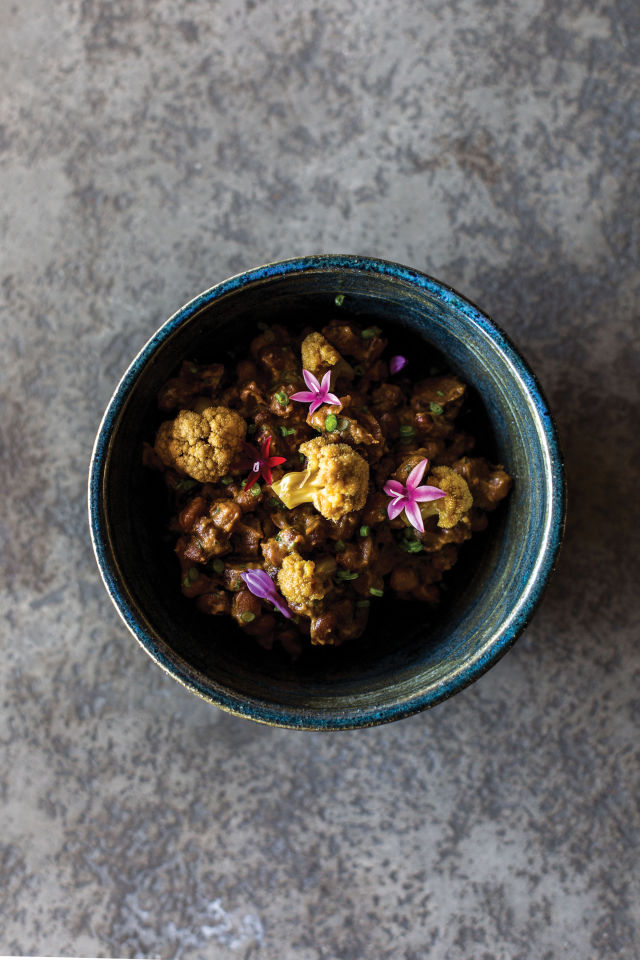
"If Marcus Garvey..." showcases pickled cauliflower.
Image: Jenn Duncan
There are practical challenges Indigo must overcome to succeed. Among those are the slightly out-of-the-way location; the pay-upon-reserving, no-refunds system; and, depending on how you look at it, the BYOB policy. Attention should be paid to the music. I loved the playlist of soul and funk, but at times it was too loud, and on one visit, the same songs kept playing over and over. I didn’t need to hear 25 minutes of “You Dropped a Bomb on Me.”
These things should not deter Houstonians from paying Indigo a visit. Rhodes wholeheartedly believes in the concept, something he demonstrates at each service, growing impassioned when explaining his dishes and chatting with guests during and after meals. And he seems to have a head full of good ideas, in regard to the fine cuisine on his constantly changing menus and beyond.
Rhodes is planning to expand to the space around Indigo. He wants to build a community garden and offer produce to people living in the neighborhood. I hope he gets the opportunity to see through these goals, because what he’s creating on Berry Road is important and necessary.
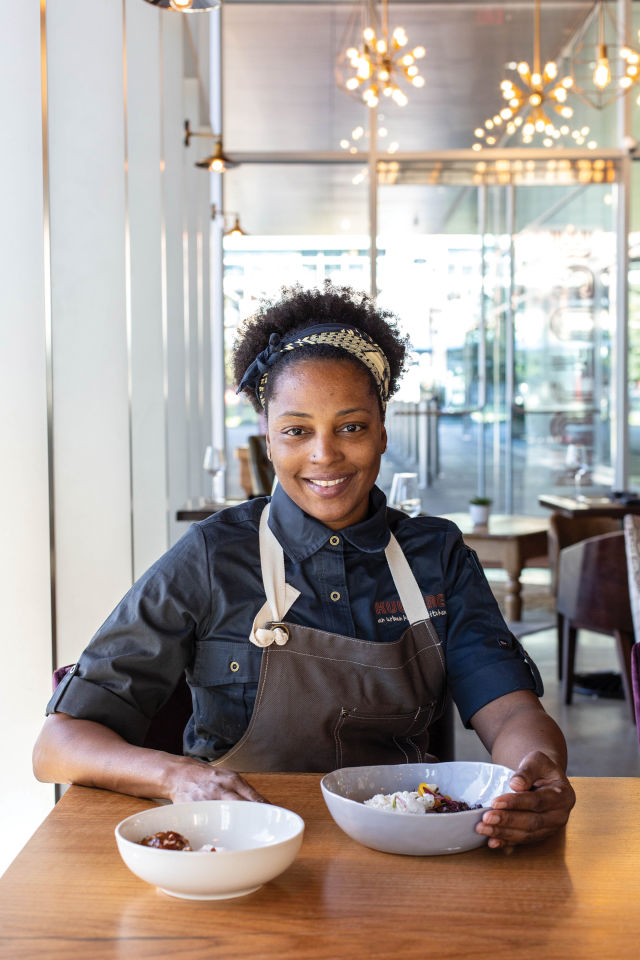
Chef Dawn Burrell at Kulture
Image: Jenn Duncan
It’s hard to miss Kulture in its corner spot at Avenida Houston, at the ground floor of Partnership Tower downtown. With its tall glass windows, high ceilings, and bright dining room illuminated by a red sign declaring its name, this concept from legendary Breakfast Klub owner Marcus Davis announces its presence loudly.
Kulture opened a year ago, promising to explore the cuisine of the African diaspora with a menu of Caribbean-Southern favorites. Unlike at Indigo, there’s no chef or server connecting the dots for diners, although one wall is hung with a large photo of a family eating dinner, and another displays spoons, a pot, and various spices.
The tempo here is light and bouncy, with TVs above the bar inviting patrons to relax over their drinks and small plates. Leather furniture encourages lounging. A jazz band plays on the weekends and, when full, the dining room is positively vibrant.
But what about the soul food? Dawn Burrell, Olympic hurdler–turned–acclaimed chef, runs the kitchen, serving a menu of salads and shareable, small, and large plates. And she mostly shines in her interpretations of this historic cuisine.
I have a predilection for deviled eggs, and Burrell’s are one of my favorite iterations of this classic dish—velvety, and filled with pickled shrimp, with just a hint of mustard to let the crustacean shine. Another hit is the wafer-thin bread and nutty, creamy black-eyed-pea hummus. And I couldn’t stop sopping up the rich collard dip with the chef’s airy calas, or rice fritters.
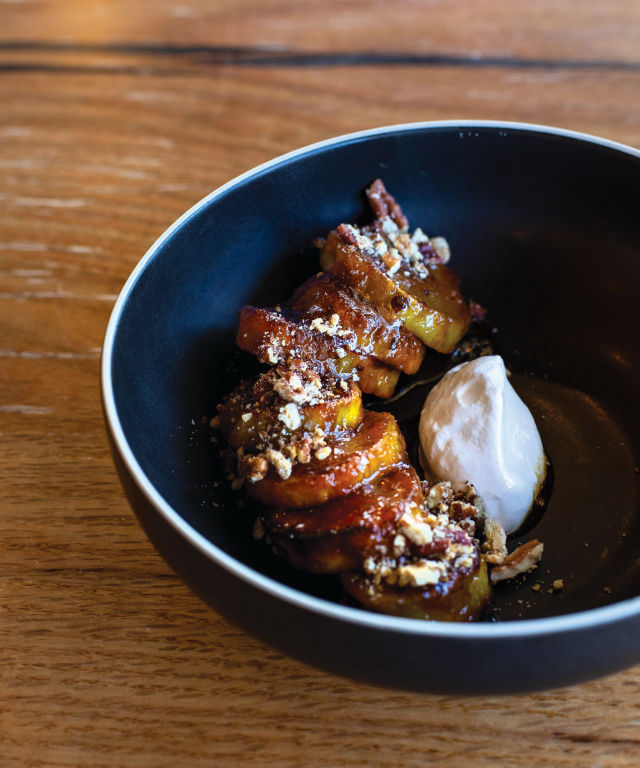
The yams with marshmallow swirl
Image: Jenn Duncan
Burrell jazzes up her house salad by surrounding lettuce and radish with a ribbon of ranch dressing, crushed candied pecans, and tiny fried green tomatoes. I liked these additions so much, I was left wanting more of them.
Small plates include tender sliced yams coated with crushed pecans and a slightly charred molasses sauce, served with a finely whipped marshmallow swirl. I wanted to ensure each bite had a little of everything, for a perfect balance of flavors. Nearly as good are the collard green purses, presented with smoked turkey and pickled collard stems, though the broth could’ve been richer.
Among the large plates, the juicy browned oxtail with crispy puffed beef tendons, served with a little-too-salty batch of coconut grits, is tasty, and the right serving size for one diner. Meanwhile, the pork and beans, a toothsome stew of beans surrounding a crispy pork shank the size of a hat, could feed a family.
There’s a full bar and a short cocktail list. The Dirty Old Fashioned, made with house brown sugar syrup, is a little sweet for my tastes. Better is the Pomegranate Mule, made with a milder house pomegranate syrup that balances well with the vodka, ginger beer, and lime. Local beer is available on tap, while the wine list includes selections from South Africa.
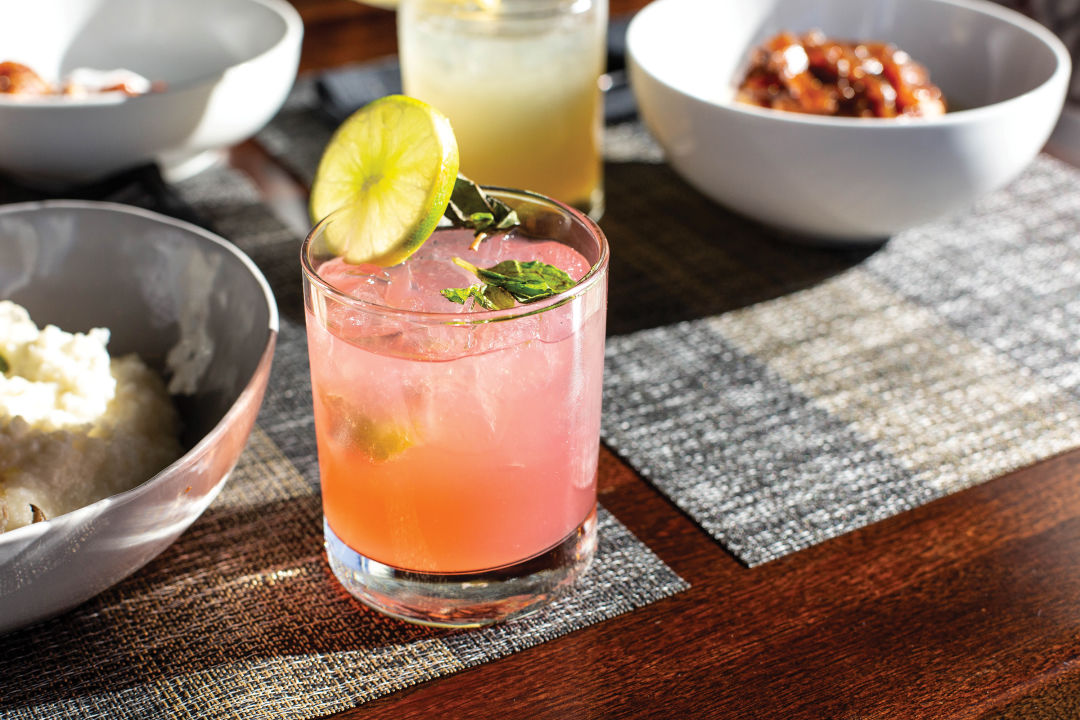
The refreshing Pomegranate Mule
Image: Jenn Duncan
I’ll be back to Kulture with a group on a night when there’s live jazz. We’ll get cocktails, the dips, the pork, a couple sides of yams, and the lovely bread pudding, topped with crisp apples and a silky whiskey-caramel sauce—we’ll only need one order of that. And I’ll be back to Indigo, too.
Whereas Indigo aims to grab your attention and make you think, Kulture invites diners to engage in their own way. What unites the two is the reminder that an oppressed people’s struggle to survive has produced an essential cuisine that is forever part of our history.




